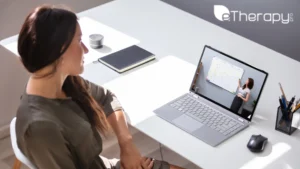Attending the first online therapy session is always a difficult experience. Most people don’t know how to begin or what to expect. The situation can be even more difficult if you are online since you’re not talking to the therapist face-to-face. Fortunately, it doesn’t have to be that difficult. Here are some tips that can help you communicate with your therapist effectively and make the most out of your first session:
1. Take Time to Know the Therapist
Most people don’t think this is an important part of therapy but understanding your therapist and their background can help you feel more grounded. For example, if you are struggling with social anxiety disorder and the therapist says they specialize in the field, you will feel more at ease.
Most online therapists will provide a short introduction to help you understand their background and give an idea about their personality. That will help you feel more comfortable with the therapy session.
2. Start a Discussion
Starting a discussion with a stranger online in such circumstances can feel a little uncomfortable and awkward. However, the initial discussion is a hurdle that you must overcome. There are several ways to approach this. Usually, a therapist will start asking guiding questions to get to know you better. Their goal is to make you comfortable and get a read on your personality as well as issues. The form you filled out earlier already provides some information to them but that’s not enough for them to start helping you.
It is important to meet your therapist halfway by communicating with them honestly. You don’t want to give them a mistaken impression of your circumstances or issues. If they ask questions, answer them as honestly as they can. If the topic is too difficult to discuss, you can always say you’re not comfortable and don’t wish to discuss it.
The therapist will move on to another topic and you can revisit the issue at a later date.
3. Ask Questions
If you have any questions or concerns, don’t be afraid to ask them. For example, if you want to know more about the therapist’s qualifications, ask them. If you want to know more about their experience with your particular concern, ask them.
Asking questions also helps improve communication between the patient and the therapist. It allows the therapist to understand what your concerns are and address them fully in the first session itself.
When it comes to online therapy, many people are hesitant and wonder if this medium is effective. You can ask your therapist directly about how effective eTherapy can be for your particular concern.
4. Setting Goals
Setting goals is an important aspect of beginner sessions. What do you want to work on? Which issue do you want to resolve first? Setting a goal allows the therapist to create a guided path and plan every session.
For example, do you want to treat your intense social anxiety? Then that should be the goal of your therapy with the counselor. Do you want to address negative and depressive thoughts? If so, that will be the goal you work towards.
Sometimes, patients don’t understand their mental health concerns. They don’t know why they experience certain symptoms like self-sabotage, extreme self-criticism, and more. In such cases, a therapist may take a few sessions to come up with a goal. But usually, this is decided in the first session.
5. Confidentiality
Online counselors follow the same ethics and guidelines as traditional counselors do. You can expect everything you say to your therapist to remain confidential. The therapist will not share the information with anyone unless this information is harmful to you.
Regardless of your age, you can expect the therapist to respect your privacy and confidence. They will not share what you say with anyone unless they have your express permission.
6. Technical Issues
Technology improves every day but technical issues can still happen. You may lose connection, experience glitches, or face a system downtime during your session. They are an inevitable part of using technology. Some issues may pop up on your end and some issues may pop up on the therapist’s side.
While technical issues can be disruptive, don’t get frustrated. Resolve them calmly and if they can’t be resolved quickly, reschedule your session with the therapist.
If you experience technical issues in your first session with the therapist, don’t be discouraged and give up. Like all problems, these can be fixed and you will be able to attend sessions smoothly. Good eTherapy platforms are well-maintained and will run smoothly.
Attending the first session is a positive step towards better mental health. All you need to do is to remain on this path and continue forward. Eventually, you will get used to this medium of communication and hit your stride.










